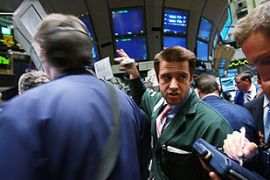US senate debates bailout plan
Investors remain nervous as US politicians debate amended $700bn bill before vote.

The vote was called late on Tuesday, after Democratic and Republican negotiators agreed on the terms of the amended bailout, which includes extended tax cuts for businesses.
In another new measure, the bill, which requires 60 votes in the 100-member senate to pass, raises the limit on federal insurance for bank deposits from $100,000 to $250,000.
Tax breaks
Barack Obama, the US Democratic presidential candidate and Illinois senator, told the senate that while the plan was not perfect, it needed to be passed.
“It’s clear that, from my perspective, that this is what we need to do right now to prevent the possibility of a crisis turning into a catastrophe.”
John McCain, the Republican candidate, was also set to leave the campaign trail to come back to Washington for the vote.
| IN DEPTH |
|
Economic analysis of bailout rejection Fighting against US foreclosures |
It retains most facets of the original plan which gives Henry Paulson, the US treasury, the power to buy failing mortgage-related assets from troubled banks and includes restrictions on pay-offs to financial executives.
Opponents of the bill have expressed concerns over handing that much power to one man, and reject the idea of using taxpayers money to bailout out disgraced Wall Street firms.
Steny Hoyer, the Democrat leader of the House of Representatives, raised concerns that some of his fellow Democrats who originally voted for the bailout might reject it over the senate’s extension of expired tax breaks for businesses.
“There’s no doubt the tax package is very controversial. The senate, in my opinion, is adding that on because they think that’s the only way they can get it passed,” Hoyer told NBC news.
George Bush, the US president, also urged senators to pass the bill to stabilise financial markets.
“The bill’s different, it’s been improved, and I’m confident it’ll pass.”
Market turmoil
Weeks of financial turmoil were sparked after several major US financial institutions were forced to the edge of bankruptcy following losses sustained in the subprime mortgage crisis, when people accepted loans they were later unable to repay.
| IN VIDEO | ||
|
Other global financial institutions have been caught up in the crisis, which has caused chaos on global markets.
The Dow Jones Industrial Average suffered heavy opening losses on Wednesday and ended down 13.22 points (0.12 per cent) at 10,837.44 at the closing bell.
Earlier, Asian financial markets recorded gains amid renewed hope that the plan would be adopted.
European stock exchanges were mixed at the close of trading, with the London FTSE 100 index of leading shares gaining 1.17 per cent at 4,959.59 points.

